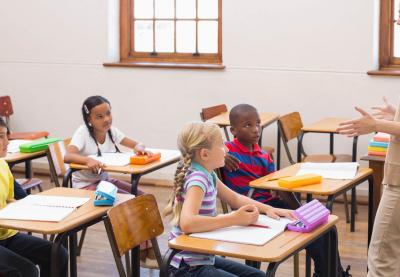As a former first-grade teacher and current professor of elementary education, I am familiar with the days mired in testing, scripted curricula and pacing guides that center literacy and mathematics. I am familiar with the idea that not everything can fit, that social studies is a subject that is difficult to "get to." I am also familiar with common misconceptions about social studies: that it's merely the memorization of state facts, the branches of government or toe-tapping songs about how a bill becomes a law.
In light of the fierce civic consciousness and empowerment demonstrated by the survivors of the mass shooting at Marjory Stoneman Douglas High School in Parkland, Florida, I am writing to implore teachers, particularly elementary teachers, to consider social studies differently.
Social studies helps students understand their history, their lives as citizens in a democracy and their potential as agents of change. Social studies should not be, cannot be, confined to any one hour. Instead, it saturates student learning. Every day, throughout the day, students work to understand who they are, to identify their place and their potential in the world. Throughout the day, they consider how their lives are influenced by the ways they are treated and the ways they are encouraged to treat each other. Throughout the day, they grapple with issues that affect their lives, in and outside of school.
Social studies provides a touchstone for the higher purposes of education. For what purpose are children learning to read? To write? To solve mathematical equations? Is it really to determine how many trucks Juan has left after Jill takes one away? Or is it to be able to identify and solve the problems in our world?
As the educational philosopher John Dewey attests, we are not born knowing how to navigate life in a pluralistic, democratic society. We are educated or miseducated about democracy through our interactions with each other. School is one of the first and most important institutions that shapes our understanding of what it means to discuss, debate, disagree and take action in the democratic life of our community.
The students of Parkland attribute their preparedness to navigate civic life—to protest, demand the responsiveness of their elected representatives, and call out the NRA—in part to an AP Government teacher who facilitated a lesson on special interests and civic action on the day of the shooting. As Emma González proudly admits, much of her iconic 11-minute speech on the need for gun reform was drawn from her notes on that lesson.
As teens across the nation have demonstrated, high school students are ready and able to confront the injustices that have shaped their lives, including the lives taken from our communities every year by gun violence. They are examining why the United States has a larger gun problem than any other developed nation, exploring how laws could reduce the number of innocent lives lost.
Our elementary school students are ready, too. Whether we recognize it or not, children are spending years of their lives in schools internalizing educators' values, our visions of what matters—and how they matter. Each day that teachers are silent about community issues in the classroom, children learn to be silent. Each day that teachers do not engage students as active civic agents, children learn to be passive subjects of laws they cannot yet vote to change.
Education is not preparation for life; education is life itself. That's another important concept from Dewey. I ask elementary teachers: What life are you creating in your classroom? Does it empower your students to end community tragedy in all its forms? Or is it designed to fit on a worksheet?
The health, safety and equity of our world depends, in part, on teachers' ability to create curricula and use pedagogy that engage children as storytellers, problem solvers and civic agents in the context of real community issues. The children of Parkland and Birmingham represent flashpoints for the potential of children to take on what the adults in their lives have been unable to achieve. Elementary educators must not neglect their unique, essential role in fostering the civic voices of their students.
Toward this goal, I urge you to facilitate pedagogies of active civic engagement. Have students contact their public officials about topics that matter to them. Have them write letters to the editors of local newspapers, create educational campaigns to inform their peers, and connect with children around the world who are speaking out against policies that limit their learning and life chances.
This is especially important for students who may not have the same privileges and resources as the Parkland students. Meira Levinson writes in her book No Citizen Left Behind that children of color and children growing up in poverty are less likely to experience a civically empowering education. The health of our democracy is proportional to the ability of each citizen to participate.
Our children are citizens, and they are often the canaries in the coal mine—indicators of the air quality for all of our nation's people. Let's make sure we're doing right by them.
Beck is an assistant professor of teacher education at California State University, Bakersfield, and a Faculty Fellow with the Kegley Institute of Ethics.


0 COMMENTS